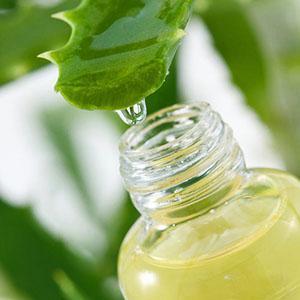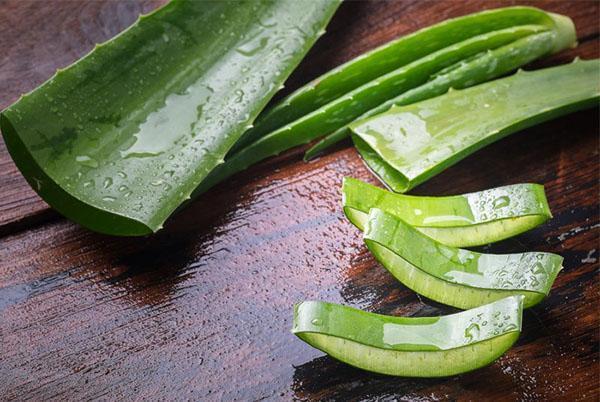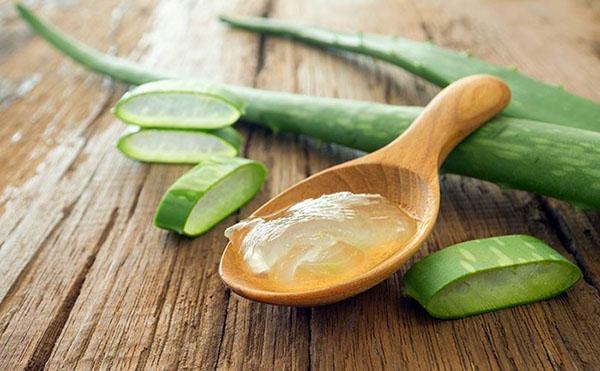The use of aloe juice for healing the body
 Aloe always has a record number of pages in the reference literature on medicinal plants. And this is not surprising, because aloe juice, its use in folk and official medicine are worthy of careful consideration and description.
Aloe always has a record number of pages in the reference literature on medicinal plants. And this is not surprising, because aloe juice, its use in folk and official medicine are worthy of careful consideration and description.
If you look around the windows of an apartment building, in several of them you can definitely discern the recognizable outline of aloe. Despite the abundance of medicines in pharmacies, aloe juice from a freshly plucked leaf is still in demand as in the days of our grandmothers' youth.
What is the use of aloe juice, and what beneficial substances in its composition are worthy of the closest attention?
Aloe juice composition

Once the aloe leaves have been cut off, you cannot hesitate. After spending more than three hours in the air, plant raw materials lose most of their beneficial qualities, and the juice in the foliage due to drying remains much less.
If the juice is needed after a while, it is better to wrap the aloe in foil and store it in the vegetable compartment of the refrigerator. Here, fresh raw materials will last up to three days.
The substances that make up the basis of the healing aloe juice:
- Vitamin C provides the body's defenses, participates in maintaining the elasticity of blood vessels, is present in the composition of cells.
- Vitamin A derivatives normalize metabolic processes, regulate cholesterol levels, and are indispensable for maintaining the sensitivity of the retina, which confirms the benefits of aloe juice for the eyes.
- A complex of numerous vitamins, macro- and microelements, without which the most important processes in the human body are impossible. Regular replenishment of these compounds helps to strengthen the immune system, normalize metabolism and metabolism.
- Organic and amino acids, tannins, antioxidants and flavonoids. All these substances are truly irreplaceable, and their deficiency necessarily affects the general well-being, the intensity of digestion and absorption of food, the state of the vascular system, the body's resistance and the rate of aging.
 The use of aloe juice allows you to maintain the bacterial balance of the digestive system, fight pathogenic microflora, disinfect and anesthetize damaged skin areas.
The use of aloe juice allows you to maintain the bacterial balance of the digestive system, fight pathogenic microflora, disinfect and anesthetize damaged skin areas.
It is obvious that a product with such a unique composition should have a lot of useful qualities. Since there are more than three hundred species of aloe in nature, the proportions and concentration of active compounds in their juice are different.
The most common variety in room culture - aloe tree - makes an excellent juice for the treatment of inflammatory skin diseases, abrasions and cuts. Such juice will help home grown aloe, from a cold, will be useful in the fight against acne or long-lasting wounds. But for internal use, it is more correct to purchase aloe juice at the pharmacy.
Indications for the use of aloe juice
 Today, based on the juice of medicinal plant varieties, several healthy products are prepared.In addition to pure aloe juice, in the pharmacy you can buy a medicinal composition enriched with iron, syrup and sabur - a concentrated, evaporated juice, presented in the form of a powder. Also in the pharmacy network you can see a drug based on juice in ampoules, this tool is used for subcutaneous and intramuscular injections.
Today, based on the juice of medicinal plant varieties, several healthy products are prepared.In addition to pure aloe juice, in the pharmacy you can buy a medicinal composition enriched with iron, syrup and sabur - a concentrated, evaporated juice, presented in the form of a powder. Also in the pharmacy network you can see a drug based on juice in ampoules, this tool is used for subcutaneous and intramuscular injections.
Freshly squeezed aloe juice is useful for a variety of ailments and health problems. Outwardly, the juice is used as a strong anti-inflammatory agent for various skin diseases, accompanied by suppuration, dryness, oozing rash. Aloe juice is useful for the skin of the face. It actively softens, moisturizes, relieves irritation, and stimulates regeneration. These qualities of a healing product are well known to dermatologists and cosmetologists, who advise masks, lotions and wipes based on aloe for acne that occurs with acne.
The medicinal properties of herbal raw materials are used by doctors who use the juice in dentistry, gynecology and for rehabilitation after surgery.
Aloe juice is able to alleviate the course of diseases of the digestive system, for example, gastritis with low acidity, when food is sluggishly digested, accumulates in the intestines and causes a lot of unpleasant symptoms. Taking juice and other aloe preparations helps to normalize acid production, suppress the development of harmful microflora and restore good health.
 Traditional medicine recommends aloe for male strength. A decrease in potency is often associated with a hidden course of certain ailments. The plant sap has a diuretic effect, gently disinfects and relieves pain.
Traditional medicine recommends aloe for male strength. A decrease in potency is often associated with a hidden course of certain ailments. The plant sap has a diuretic effect, gently disinfects and relieves pain.
Another male problem that fades into the background after starting to take aloe juice is baldness. Fresh aloe vera juice is beneficial for hair for many reasons. This remedy:
- activates the work of hair follicles;
- helps to cope with seborrhea, which often causes weakening of the hairline;
- moisturizes the skin, nourishes it, improving blood circulation and respiration;
- relieves excessive dryness and itching.
 As a result of the systematic use of aloe juice in the composition of masks, lotions and rinsing, it soon yields visible results in the form of healthy, shiny, lush curls.
As a result of the systematic use of aloe juice in the composition of masks, lotions and rinsing, it soon yields visible results in the form of healthy, shiny, lush curls.
Inflammatory diseases of the respiratory system can also be treated with drugs made with aloe juice. With its antibacterial, emollient, expectorant effect, herbal medicine helps to cope with such serious ailments as pneumonia and tuberculosis. For the common cold, aloe is used in the form of drops that disinfect the mucous membrane of the nasal cavity and facilitate breathing. And for sore throats, they drink a useful mixture with aloe juice, cocoa and other components.
Contraindications to taking aloe juice
 Adherents of traditional medicine and those who prefer to heal on their own need to clearly remember that the great benefits of using aloe juice can turn into the opposite effect if:
Adherents of traditional medicine and those who prefer to heal on their own need to clearly remember that the great benefits of using aloe juice can turn into the opposite effect if:
- do not follow the recommended dosages;
- ignore the existing contraindications.
The rich biochemical composition of the product has not yet been fully studied, therefore, doctors cannot predict and predict all aspects of the effect of juice.
One of the serious limitations regarding the intake of aloe is the risk of burns to the mucous membrane and tissue of the eyeball. Therefore, aloe juice for the eyes must be diluted in half with boiled water. This does the same when the agent is used to treat rhinitis. A common remedy, instead of easing breathing, can dry out the inflamed surface of the mucous membrane and lead to an exacerbation of the disease. That is why doctors do not recommend using aloe for a cold in children.
The use of juice in any form for babies up to a year is contraindicated. It is highly undesirable to take the drug internally for older and elderly people, as well as with a weakened immune system.
In addition, contraindications to the use of aloe juice include:
- pregnancy;
- menses;
- the presence of allergies to plant materials;
- inflammatory diseases of the urogenital organs in the acute stage;
- cholecystitis;
- certain ailments of the gastrointestinal tract;
- internal bleeding;
- hemorrhoids.
 Aloe and the juice of this unique plant are rightfully considered the most powerful biostimulants that give impetus to numerous processes in the body. It is impossible to independently predict all the consequences of using aloe juice, therefore, in this case, it is more useful to refuse self-medication and listen to the opinion of doctors.
Aloe and the juice of this unique plant are rightfully considered the most powerful biostimulants that give impetus to numerous processes in the body. It is impossible to independently predict all the consequences of using aloe juice, therefore, in this case, it is more useful to refuse self-medication and listen to the opinion of doctors.